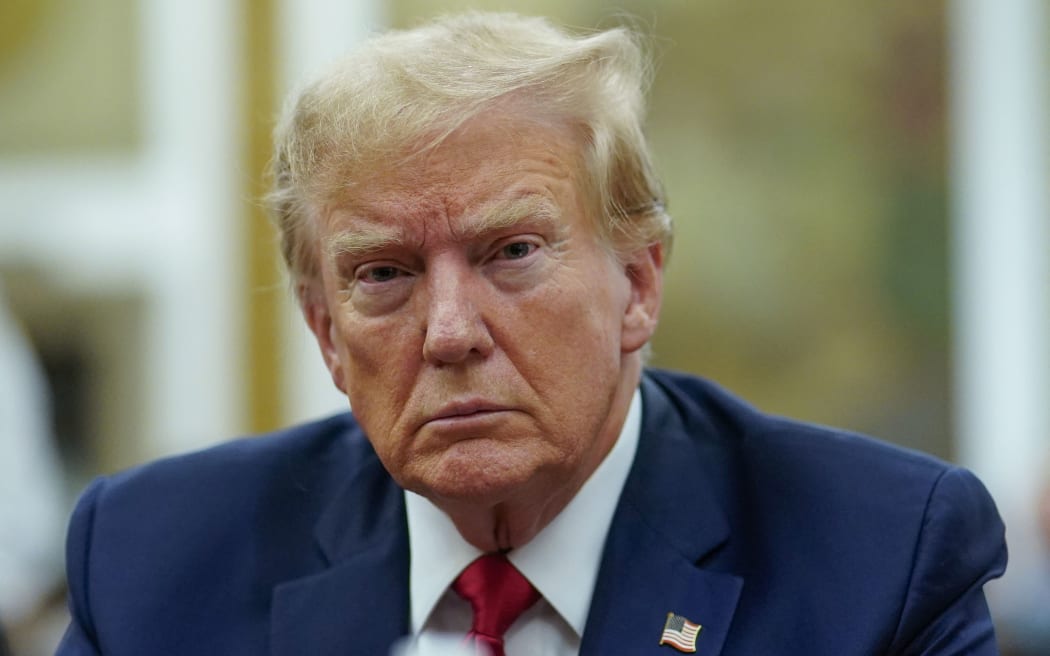Former US President Donald Trump faces 91 felony counts across four criminal cases. Believe it or not, that's not enough to bar him from the White House

Trump is embroiled in four criminal cases, and one civil. (file picture). Photo: AFP
The US Supreme Court has heard arguments about whether Donald Trump is eligible to run for president and is currently deliberating over the issue.
Does encouraging a mob to overthrow the results of a democratic election rule you out?
The case hinges on the 14th amendment, a civil-war era revision to the US constitution; the section in question bars any person who has "engaged in insurrection" from holding office.
Inside the courtroom, the question is whether Trump is constitutionally eligible to be president again. Outside, the question is -- even if he is -- whether America would re-elect him.
"There's nothing that says a criminal can't be elected president of the United States. It has never been an issue before but it is an issue America is going to have to deal with this year," said Scott Detrow, who hosts Trump Trials, a podcast that follows the many legal troubles of Trump.
The presumption is that the Supreme Court will rule in Trump's favour, in part because of the fear that ruling against him would set a precedent for states to bar candidates from their ballots.
"Increasingly you're seeing everyone from President Biden on down just kind of assume that it's going to be a rematch in November of Trump versus Biden, and Trump's going to be on the ballot for the third election in a row," Detrow said.
Meanwhile, Trump is embroiled in four criminal cases, and one civil. Two of his criminal cases relate to trying to interfere with the results of the 2020 election. A third is to do with the accusation that he paid hush money to a porn star, and the fourth is based on allegations that he removed classified and highly sensitive national security documents from the White House, and stored them around his resort, Mar-a-Lago.
Then there's a civil case in New York, where Trump is accused of committing fraud by inflating the worth of his properties. (Another civil case, recently settled, found Trump liable of defaming journalist E. Jean Carroll.)
Strangely, these legal battles may actually be helping Trump in primary season.
"He wasn't dominating the race, and that changed the moment he started to be charged with crimes, especially being charged with crimes by district attorneys in democratic parts of the country. Republican voters rallied around Trump, they felt like he was being unfairly targeted," Detrow said.
But he predicts that the picture will change as the general election approaches.
"I think as we start turning to a broader national election it's going to be a much different situation, because there's a lot of independent voters, there's a lot more left-leaning voters who are horrified at the idea of somebody facing criminal charges or even convicted of criminal charges becoming president of the United States," Detrow said.
There's also doubt as to whether any of these trials will be decided before the election - and if not, what that will mean. Detrow has a prediction.
"Two of these criminal cases are brought by the federal government. If he's in charge of the federal government again, he can pardon himself, he can order the Justice Department to stop enforcing the case. And those two cases would probably go away," he says.
Trump wouldn't have power over the other two cases, in New York and Georgia, but that doesn't mean they'd carry on.
"They would probably be delayed until he was out of office again."
In an election cycle filled with uncertainty, there's one major takeaway.
"The key thing in all the things were talking about right now is there are all these things that have never been tested before, that have never come up before because no other time in American history has a former president been charged with crimes," Detrow says.
Check out how to listen to and follow The Detail here.
You can also stay up-to-date by liking us on Facebook or following us on Twitter.


